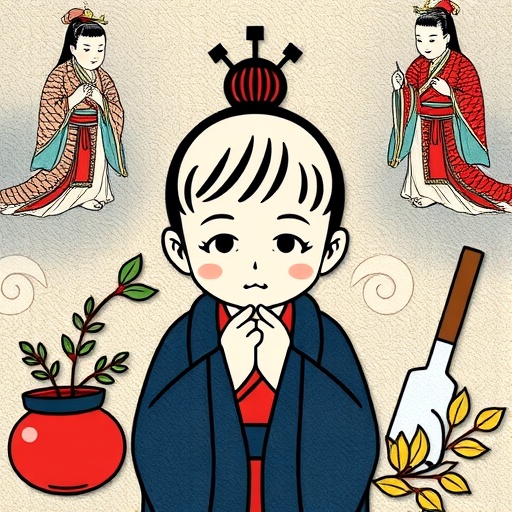In recent years, a rising body of evidence has emerged suggesting that traditional medicine, particularly from East Asian cultures, may offer promising alternatives or complements to conventional treatments for attention-deficit hyperactivity disorder (ADHD) in children and adolescents. A recent scoping review published in BMC Complementary Medicine and Therapies sheds light on this fascinating topic, evaluating various East Asian traditional medicine practices aimed at addressing ADHD symptoms and exploring their efficacy.
ADHD, characterized by inattention, hyperactivity, and impulsivity, affects millions of children globally, making it a significant public health concern. While pharmacological treatments such as stimulants are the most common interventions, they are not universally effective and can come with a range of side effects. This gap in effective treatment options has led many parents and practitioners to explore traditional medicine alternatives that have been used for centuries in cultures throughout East Asia.
The scoping review, authored by Lee and Sung, systematically examines the existing literature on East Asian traditional medicine for ADHD, including acupuncture, herbal medicine, and mind-body therapies. The authors emphasize the significance of gathering insights from this body of knowledge to understand how these practices can be integrated into modern treatment paradigms for ADHD. Their comprehensive analysis offers a unique glimpse into the potential benefits of these age-old practices.
Acupuncture, a cornerstone of traditional Chinese medicine, is one of the therapies assessed in the review. Anecdotal evidence and preliminary studies suggest that acupuncture may help alleviate some symptoms of ADHD. By stimulating specific points on the body, acupuncture aims to restore the balance of energy, known as qi, which may lead to improvements in focus and behavior. However, more rigorous scientific research is necessary to establish its effectiveness conclusively.
In addition to acupuncture, herbal medicine has played a pivotal role in traditional East Asian healthcare. Plant-based formulations, often encompassing a blend of diverse herbs, are thought to offer therapeutic benefits for ADHD symptoms. The review details various herbal remedies that have been utilized traditionally, highlighting how they are believed to influence neurotransmitter activity or reduce hyperactivity. As promising as these herbal treatments may seem, it is crucial to approach their application with caution, given the potential for variability in preparation and consistency.
Mind-body therapies, rooted in ancient philosophies, have also gained traction as complementary treatments for ADHD. Practices such as tai chi and qigong not only promote physical health but also emphasize mental well-being through controlled movements and mindful breathing. These activities may enhance concentration and reduce stress, potentially providing ADHD patients with tools to manage their symptoms in a holistic manner. The authors discuss the neurophysiological mechanisms that underlie these practices and how they may help improve cognitive functions relevant to ADHD.
The review not only chronicles the therapeutic potential of these traditional practices but also critiques the current landscape of research. Lee and Sung highlight the need for more rigorous clinical trials to validate these treatments. While the traditional methodologies are steeped in historical significance, the scientific community must adapt these practices into controlled settings to measure their efficacy and safety accurately.
Additionally, the cultural considerations surrounding the acceptance and integration of traditional medicine into mainstream healthcare are discussed. Many families from East Asian backgrounds might inherently trust these practices due to their cultural roots. However, there is a pressing need for healthcare providers to engage in informed discussions with patients and their families about integrating these treatments ethically and effectively into a comprehensive ADHD management plan.
Importantly, the review acknowledges the limitations present in the existing body of literature. It often suffers from small sample sizes, lack of control groups, and inconsistencies in reporting outcomes. Overcoming these challenges will be pivotal in advancing the understanding of how East Asian traditional medicine can contribute to ADHD management. Robust, peer-reviewed studies are essential to not only fortify claims about efficacy but also to guide clinical practice effectively.
As the stigma surrounding alternative treatments begins to wane, more families are considering traditional medicine as a viable complement to conventional methods. The review by Lee and Sung serves as a critical compendium that may encourage further research and discussion among healthcare professionals, leading to more integrative treatment approaches. Addressing the complexities of ADHD necessitates a multifaceted strategy that acknowledges diverse healing traditions while adhering to evidence-based medicine.
The investigation also opens avenues for discussions about personalized medicine. Every child with ADHD presents a unique constellation of symptoms and challenges. Recognizing that a one-size-fits-all approach may not be effective, incorporating traditional therapies could lead to tailored treatment plans that accommodate individual preferences and cultural backgrounds.
In conclusion, the scoping review by Lee and Sung shines a spotlight on the untapped potential of East Asian traditional medicine as an adjunct therapeutic strategy for ADHD. As research progresses and more clinicians acknowledge the value of holistic approaches, there exists a profound opportunity to reshape ADHD management paradigms. The blend of ancient wisdom and modern scientific inquiry can foster approaches that not only treat symptoms but promote overall well-being for young patients navigating the complexities of ADHD.
Subject of Research: East Asian traditional medicine for ADHD in children and adolescents
Article Title: East Asian traditional medicine for attention-deficit hyperactivity disorder in children and adolescents: a scoping review
Article References:
Lee, J., Sung, HK. East Asian traditional medicine for attention-deficit hyperactivity disorder in children and adolescents: a scoping review.
BMC Complement Med Ther 25, 399 (2025). https://doi.org/10.1186/s12906-025-05119-y
Image Credits: AI Generated
DOI: N/A
Keywords: Traditional medicine, ADHD, acupuncture, herbal remedies, mind-body therapies, children’s health, integrative medicine.
Tags: acupuncture for attention deficit hyperactivity disorderADHD treatment options beyond pharmaceuticalsalternative treatments for ADHD in childrenEast Asian culture and ADHD managementefficacy of traditional medicine for ADHDherbal remedies for ADHD symptomsholistic approaches to ADHD treatmentintegrating traditional practices in modern ADHD caremind-body therapies in ADHD treatmentpublic health concerns related to ADHDscoping review of ADHD and traditional medicinetraditional East Asian medicine for ADHD





